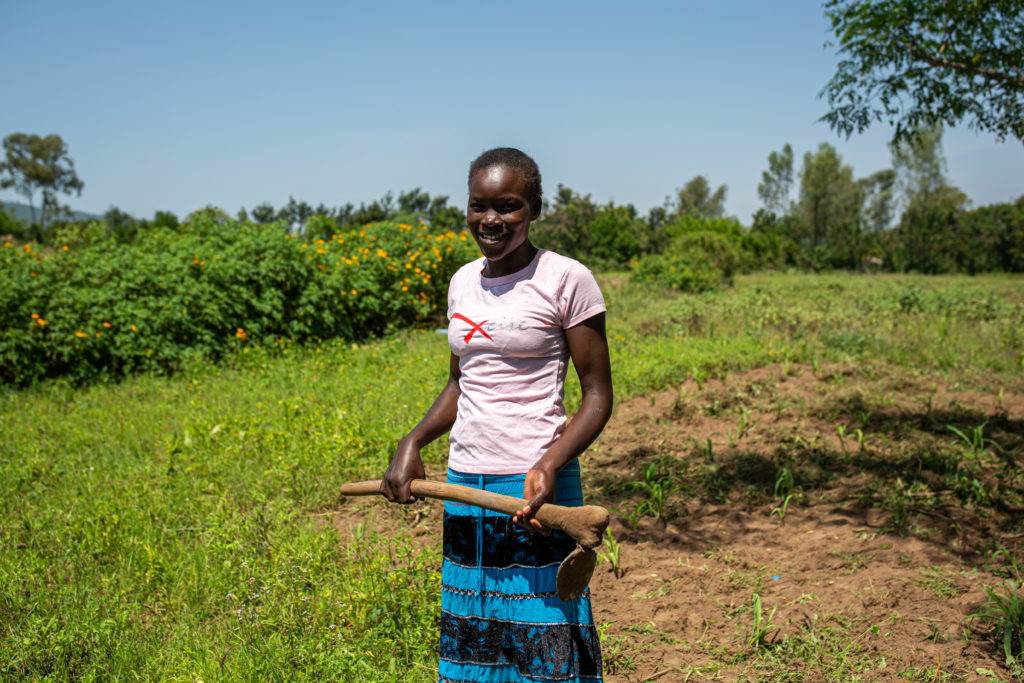In this series, we’re sharing six stories from our 2020-21 annual report that demonstrate the impact we’ve achieved in different contexts and at different scales. From a pilot project that’s set to overturn the status quo of urban migration in Kenya, to a partnership that’s already changed the game for millions in flood-prone areas around the world – and is set to do even more…
We refuse to accept that the only future for food production is an agricultural system that damages the planet, while farmers often struggle to earn a decent living. Our work with young farmers in Kenya is helping buck the trend of urban migration and demonstrating that a regenerative approach to agriculture can be profitable.

Planet-friendly techniques are making farming work for young people in Kenya.
The challenge
Farming in poorer, isolated parts of the world has always been difficult. Climate change has caused disruption to weather patterns that have made it even tougher. Many young people growing up in rural areas don’t see farming as a profitable career option. There is an exodus of young people leaving rural areas of Kenya to find work in the cities. This damaging trend is causing rural economies to stagnate and food production to slump. Communities, NGOs and the government of Kenya have struggled to implement solutions that make farming an attractive livelihood for young people.
Our goal
We’re aiming to breathe new life into rural economies by demonstrating that regenerative agriculture can create viable business opportunities for young people and thriving local economies. We know that farmers can succeed, while also preserving natural resources. Our goal is to address the inefficiencies and inequalities present in the existing system to make success possible.
What we achieved in 2020/21
Our work with young people in rural areas, in partnership with the IKEA Foundation, is building a business case to demonstrate that regenerative agriculture can be commercially successful. We’re working with an initial cohort of 6,000 young women and men, enhancing their business skills based on a planet-friendly approach to farming.
The regenerative farming techniques we’re championing includes reusing waste products from one part of the farm elsewhere. For example, chicken poo makes an excellent fertiliser for vegetables and can help improve soil health. Using techniques like this, young farmers can achieve independence and a good standard of living, while protecting the environment and giving them skills for the future.
“I never considered farming as a career because I thought it couldn’t be profitable. With the training I’ve had in farming techniques and business skills I feel confident I can succeed.”
Everlyne, young farmer in Homa Bay, Kenya
It’s not just about farming techniques. We’re also supporting young people with the business side of things. That includes identifying new business opportunities and gaps in the market and finding the best suppliers. Meanwhile, we’re working to improve the poultry, groundnut and tomato value chains, so farmers can sell their produce for the best possible price. And we’re chairing working groups, made up of commercial providers and government agencies, to tackle access to finance, training services and market information.
Our work with partners in 2020/21 means 300,000 more farmers worldwide have higher income or better food security.
Future work
Over the longer term, we’re hoping to impact 80,000 young people by demonstrating the viability of businesses in the agricultural sector. We’ll transform local market systems and create demand for products and services provided by young people to ensure the programme’s long-term sustainability. By 2021, we aim for our work with partners to have improved food security and incomes for two million people in rural communities around the world and a further one million people through wider, systemic change.